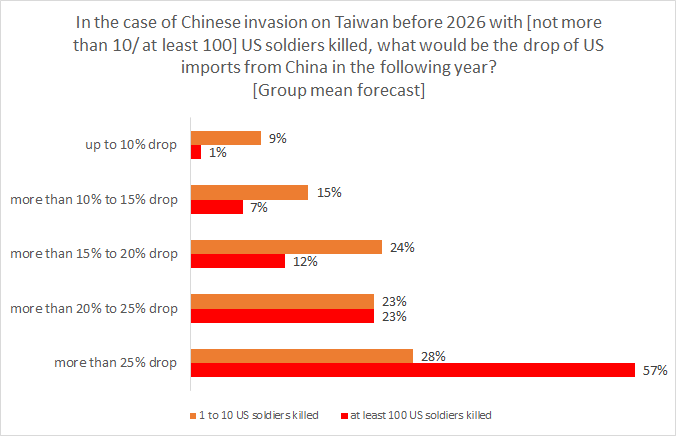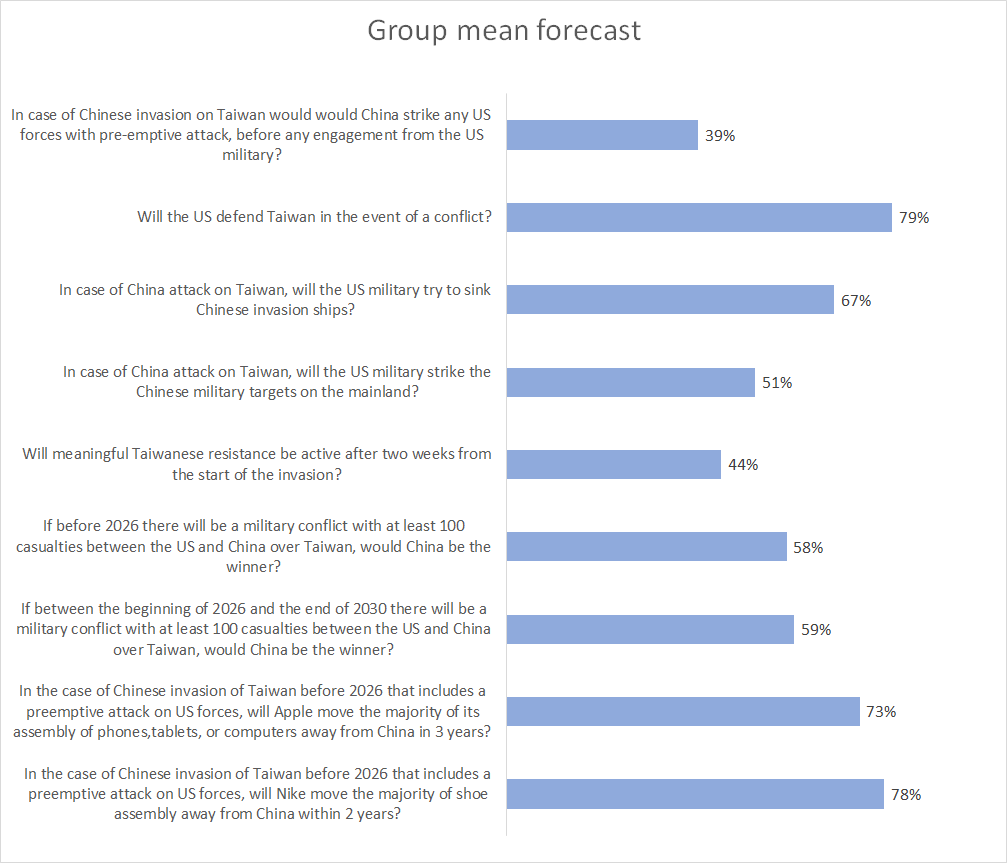Will there be a war over Taiwan?
The team expect that there most likely will not be a conflict in the near term- but if there is, the US will likely intervene, and China will probably prevail.
This week some of our forecasters’ work was featured in Unherd, where Tom Chivers writes up a forecasting exercise on the probability of the China/Taiwan conflict sparking into a shooting war, and what the likely consequences would be in terms of US military intervention and long-term economic impact.
Will there be a shooting war over Taiwan?
The headline view: unlikely in the immediate short term, but the risk is rising over time. If there is a conflict, our forecasters expect Taiwan to fall rapidly, the US to intervene, and China to probably prevail.
This most likely wouldn’t be just a local conflict: the group expect the US to intervene to defend Taiwan in some form (79% confidence), giving 67% for the US attempting to sink Chinese ships in the Strait if conflict breaks out, and 51% for the US attacking targets on the Chinese mainland (most likely missile launchers that threaten US aircraft carriers).
It also will likely be a short conflict: the group gave only a 44% likelihood of Taiwanese resistance lasting more than a fortnight.
So given those expectations, why do forecasters think it’s still unlikely that China will attack? The answer is economic damage- in the event of even a small conflict with the US, they expect big drops in trade volumes.
Let’s look at each of these points in more detail:
54% likelihood that meaningful Taiwanese resistance ends before two weeks have passed
“If we are talking about resistance that could keep substantial PLA forces occupied in the battle over the island then I am pessimistic about Taiwanese resistance prospects after the initial fight on the beaches…. I base this forecast on the reported weaknesses of the Taiwanese land army training and morale, and also current defeatism present in Taiwanese society. It is not impossible, however, that this situation will change over the coming years if the US government could persuade Taiwanese officials to adopt a realistic defense strategy.”
“Will the Taiwanese fight? I am pessimistic. It's a rich, ageing country (media age 42.5). Is freedom really worth sacrificing all the creature comforts of modernity in an exceptionally bloody war? Especially since the PRC has proved they can successfully reconcile technologically advanced modernity with their ideological system. The population is simply not trained or psychologically prepared for this kind of warfare, from what I read. The military is distrusted, due to the legacy of junta rule. Everyone hates their experience of national service. There is a shortage of the basic equipment necessary for reservists to actually fight…”
US intervention
On sinking ships:
“Sinking Chinese ships is probably the single most efficient thing the US can do to prevent an invasion from happening, but also a major escalation step. So, probability is lower than any US involvement, but a lot higher than for striking the mainland (which would mean a much greater escalation).”
“This is the bare minimum of force needed to stop an invasion, or at least make eventual victory so painful the PLA withdraws. So, will the US do it?
On US willingness to intervene:
The entire US national security establishment will want to fight for Taiwan at least in some way; it's now their entire raison d'etre. The US public is increasingly rich, fat, & old - not exactly war-fighting demographics - but public sentiment is increasingly anti-China, fuelled by both covid-19 and the Trump years. That leaves the President as the main swing factor and key actor. I think, after Trump, nearly all plausible Republicans and most Democrat presidents will fight for Taiwan over the next few decades”
On China to probably prevail
“PLA military capabilities already match the US in 4 out of 5 pillars of military power - submarine warfare is the only one in which the USA still has the advantage but China is heavily developing their capabilities as well. The PLA’s current capabilities have been specifically designed to counter the US forces in the region….China is serious about taking control of Taiwan which the CCP sees as the threat to their rule, and unification of China...is one of their ideological goals.”
“The US military itself is in no shape to burst through the Chinese A2AD bubble. It has badly bent itself out of shape while fighting the War on Terror and is overly reliant on platforms at sea and land that are very vulnerable to swift annihilation by Chinese long-range missiles within the first hours of a conflict. Fixing these problems, on both the Taiwanese and the US side, will take at least the rest of the 2020s. The problem will likely get worse over the next half decade before it gets better towards the back end of the decade, especially on the US side; this is due to obsolete platforms across multiple services going out of service before they are replaced with modernized replacements. The US is at a technological deficit for this fight AND will lose mass before it starts to resolve the problems in its force structure.
Economic damage to China in the event of conflict
If China decides to invade Taiwan and attack the US forces preemptively, we also expect US companies to move their businesses away from China within two to three years after the attack. 73% is the mean from our forecasts that within 3 years Apple would move the majority of its assembly of phones, tablets, or computers away from China. As a group we give 78% probability that Nike will move the majority of shoe assembly away from China within 2 years.
“I've tried to think of good precedents for wars between countries that had substantial trade before from the past few decades, but hardly any example seems fitting. However, even trade between the EU and Russia dropped by over 20% following the Ukraine invasion without any direct war between the EU and Russia, so I think this is really a lower bound. On the one hand, part of this was the drop in oil prices. On the other hand, the EU has fewer alternatives for Gas/Oil than the US has for a lot of products they are currently importing from China (like textiles).
Also, realistically this includes scenarios where global trade altogether and/or the GDP of the US or China drops by similar amounts, so 25% doesn't seem that high to me.”
“4 issues come to mind: 1. Supply disruption necessary to continue to manufacture goods, though in the first year, much of what would be sold will have already been manufactured. 2. Boycotts and tariffs imposed by both countries are likely to escalate throughout a conflict. 3. Public sentiment against buying anything "made in China", including parts. 4. Global economic turmoil due to the conflict.”
“If China has directly and preemptively attacked US forces, it will become untenable for Apple or any other major US company to continue to do major business with China, based on lower labor rates and ease of doing business. Both public outcry as well as legislation would likely block this. A challenge would be how long it would take to unentangle contracts and move production to other countries. How many parts are currently made in China that would take years to develop production capacity in other countries?”
In Summary
The forecasters believe that a massive Chinese military attack on Taiwan in the next 5 years is very unlikely (14%). However the world should not be happy with such odds of a war that would likely (79%) involve the US, because of the potentially devastating consequences of such conflict for all sides involved. If it wishes to take more action to prevent that war, the US will need to balance the Chinese growing military power with their own advances in weapon development and revised military strategy, as well as Taiwanese government to make much needed reforms in their defense capabilities and adapt more realistic and effective defensive strategy.






